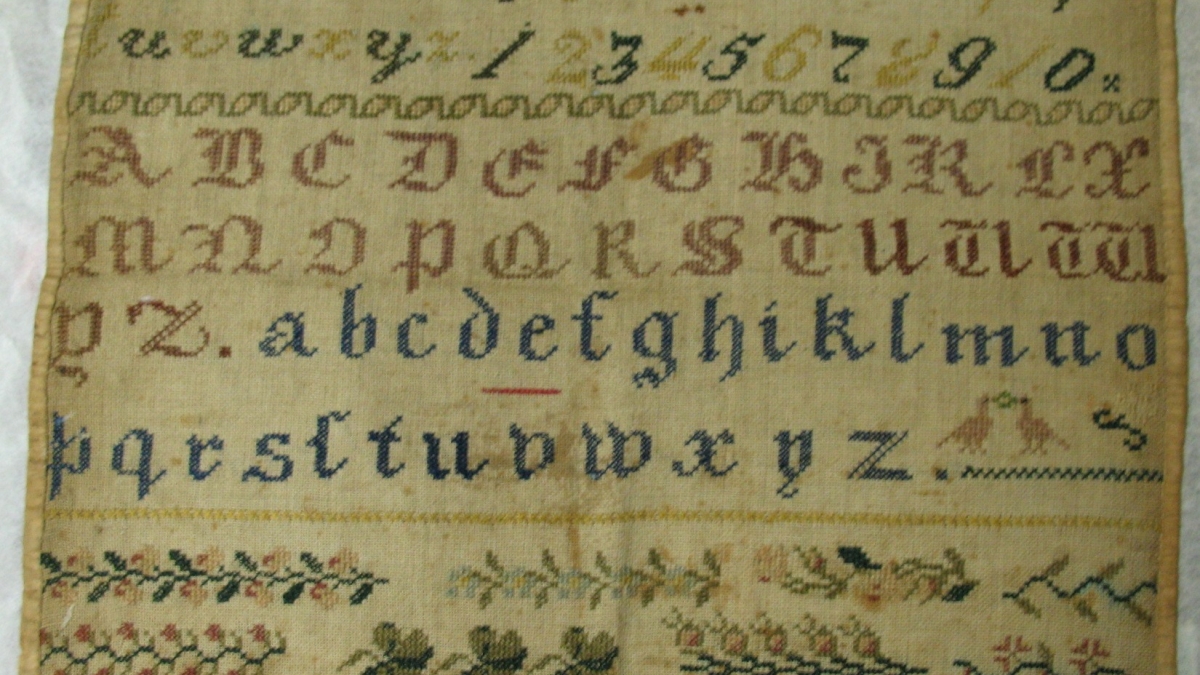Historical needlework research leads to Fulbright award for ASU professor

Arizona State University professor of English Maureen Daly Goggin has been awarded a 2015-2016 Fulbright U.S. Scholar grant for teaching and research on historical needlework practices in Austria and the Czech Republic.
Goggin, whose specialty is the study of rhetoric and material culture in the Department of English, will spend spring 2016 as a visiting professor in cultural studies at Karl Franzens University of Graz, Austria. From there, she will conduct her main research on the Graz Volkskundemuseum’s (Folklore Museum) collection of needlework samplers.
A “sampler” is an embroidered specimen representing a needle worker’s specific skill and style. It often features an alphabet or other decorative text, and sometimes the stitcher’s name and date.
Goggin has published widely on samplers as expressions of alternative literacies.
“The phrases and verses served as a pedagogical tool meant to shape the young stitcher’s virtue as she shaped her stitches,” she explained.
Her Fulbright work is part of a larger project she has tentatively titled “Women and the Material Culture of Writing with Pens of Steel and Inks of Thread.”
Since needlework has historically been undertaken by women, it has functioned – sometimes defiantly – as a gendered mode of communication and activism. Using this approach, Goggin’s work examines so-called “handicraft” work, such as knitting, crocheting and embroidery, in such movements of resistance and representation.
Goggin intends to catalogue and digitize records and images of the Volkskundemuseum’s samplers, so that they are available to other scholars, fiber artists and students. She anticipates the work to culminate in a bilingual English-German book.
“Studying everyday objects made by ordinary people offers a nuanced history of people, places and things that are often overlooked or ignored,” said Goggin. “This project will offer a tantalizing look at some of the women who plied their needle in the nineteenth and early twentieth centuries in Graz.”
Goggin will teach two courses in cultural studies as part of her Fulbright year – one at the graduate level on women and material culture and the other at the undergraduate level on a topic to be determined by the American Studies Department at the University of Graz.
She will also undertake an in-depth analysis of a specific piece of needlework housed in Sts. Cyril and Methodius Cathedral in Prague, Czech Republic. The specimen was stitched by a woman named Františka Albrechtová while a prisoner of war in the Terezin Small Fortress, part of the Theresienstadt concentration camp.
Albrechtová and her husband were executed on Jan. 26, 1943 for reportedly aiding in the 1942 assassination of Nazi leader Reinhard Heydrich. The chairman of the infamous Wannsee Conference, where much of the Holocaust was orchestrated, Heydrich was chillingly called by Adolf Hitler “the man with the iron heart.”
While most needlework that Goggin studies has been produced by women, she has also published on World War II samplers by male POWs. She locates these textiles in the movements to reveal prison artifacts – as part of assembling a complete historical picture of POW experience – and to degender needlework.
With professor of English and director of ASU’s writing programs Shirley Rose, Goggin is co-organizer of an upcoming national conference on this and other material culture topics, the Tenth Biennial Feminisms and Rhetorics Conference: “Women’s Ways of Making.” The conference will be held at ASU this Oct. 28-31.